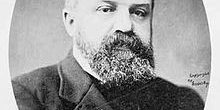Evangelism, discipleship, integrity of character, centrality of the family, and for culture to change the church must be transformed – such was the legacy of Dwight Lyman Moody, born February 5, 1837. Moody describes his childhood: “Before I was four years old the first thing I remember was the death of my father… Soon after his death the creditors came in and took everything. My mother was left with a large family of children. One calamity after another swept over the entire household. Twins were added to the family, and my mother was taken sick. The eldest boy was fifteen years of age, and to him my mother looked as a stay in her calamity, but all at once that boy became a wanderer. He had been reading some of the trashy novels and the belief had seized him that he had only to go away to make a fortune. Away he went.” Though the older brother did return, these events became marks in the development of his character.
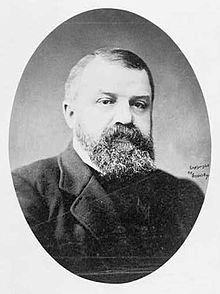 Moody was very active yet bored with church and by 17 with the family farm. He asked his Uncle Samuel Holton for a job in Boston. His Uncle did not want to hire him because he was afraid in a short amount of time he would run the shoe store! Moody had to promise to submit as well as attend Mt. Vernon Congregational Church. Kimball (his Sunday School teacher,) described his impression of him.
Moody was very active yet bored with church and by 17 with the family farm. He asked his Uncle Samuel Holton for a job in Boston. His Uncle did not want to hire him because he was afraid in a short amount of time he would run the shoe store! Moody had to promise to submit as well as attend Mt. Vernon Congregational Church. Kimball (his Sunday School teacher,) described his impression of him.
“I can truly say, and in saying it I magnify the infinite grace of God as bestowed upon him, that I have seen few persons whose minds were spiritually darker than was his when he came into my Sunday School class; and I think that the committee of the Mount Vernon Church seldom met an applicant for membership more unlikely ever to become a Christian of clear and decided views of Gospel truth, still less to fill any extended sphere of public usefulness.”
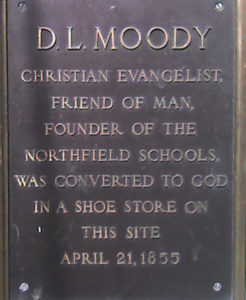 On April 21, 1855, he visited him: “I determined to speak to him about Christ and about his soul, and started down to Holton’s shoe store. When I was nearly there I began to wonder whether I ought to go in just then during business hours… I found Moody in the back part of the building wrapping up shoes. I went up to him at once, and putting my hand on his shoulder, I made what I afterwards felt was a very weak plea for Christ. I don’t know just what words I used, nor could Mr. Moody tell. I simply told him of Christ’s love for him and the love Christ wanted in return. That was all there was. It seemed the young man was just ready for the light that then broke upon him, and there, in the back of that store in Boston, he gave himself and his life to Christ.” A plaque near Boston City Hall now marks the spot where Moody became a Christian in the back of this shoe store!
On April 21, 1855, he visited him: “I determined to speak to him about Christ and about his soul, and started down to Holton’s shoe store. When I was nearly there I began to wonder whether I ought to go in just then during business hours… I found Moody in the back part of the building wrapping up shoes. I went up to him at once, and putting my hand on his shoulder, I made what I afterwards felt was a very weak plea for Christ. I don’t know just what words I used, nor could Mr. Moody tell. I simply told him of Christ’s love for him and the love Christ wanted in return. That was all there was. It seemed the young man was just ready for the light that then broke upon him, and there, in the back of that store in Boston, he gave himself and his life to Christ.” A plaque near Boston City Hall now marks the spot where Moody became a Christian in the back of this shoe store!
Moody’s frustration in just selling shoes rather than running his own business caused him to move to Chicago in 1856. To avoid family scrutiny, he didn’t tell anyone until he arrived there that he had gone! It was God’s providence that brought him to Chicago, for there he was confronted with the 1857 prayer revival and its effects. Writing home he told his mother – “I have nothing to write that will interest you unless it is that there is a great revival of religion in this city…. I go to meeting every night. Oh, how I do enjoy it! It seems as if God was here Himself. Oh, Mother, pray for us. Pray that this work may go on until every knee is bowed. I wish there could be a revival in Northfield, that many might be brought into the fold of Christ. Oh, Mother, keep the family away from the Spiritualists’ meetings, for I am afraid they may be led astray.” His hunger and thirst would only grow, and so would his evangelistic ministry!
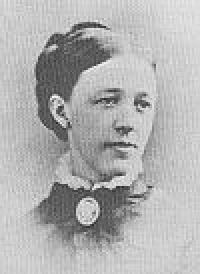 Within two years he had opened his own Sunday School, bringing in the “hoodlums” from the poorest sections of town. His blunt style of evangelism offended many, but his converts began numbering in the hundreds. In 1862 he married Emma Charlotte Revell, and their marriage would prove a blessing. He loved being in public but she behind the scenes, hosting his friends, supporting his ministry, and inspiring him to open Bible schools for girls. During the Civil War he ministered on four battlefields as well as in hospitals where wounded soldiers lay dying. He founded and built the Illinois Street Church, and on the Sunday evening of before the great Chicago Fire, told people to wait a week and consider Christ. Many did not survive the fire and the church, his home and library were destroyed. He vowed never again to tell people to wait to receive Christ!
Within two years he had opened his own Sunday School, bringing in the “hoodlums” from the poorest sections of town. His blunt style of evangelism offended many, but his converts began numbering in the hundreds. In 1862 he married Emma Charlotte Revell, and their marriage would prove a blessing. He loved being in public but she behind the scenes, hosting his friends, supporting his ministry, and inspiring him to open Bible schools for girls. During the Civil War he ministered on four battlefields as well as in hospitals where wounded soldiers lay dying. He founded and built the Illinois Street Church, and on the Sunday evening of before the great Chicago Fire, told people to wait a week and consider Christ. Many did not survive the fire and the church, his home and library were destroyed. He vowed never again to tell people to wait to receive Christ!
Moody’s European ministry trips made him famous for he preached before thousands. On one such trip to England he preached for Spurgeon and they became friends. He helped Spurgeon add the color gold for heaven to his famous “wordless” color book in sharing the gospel. After founding his Bible school for boys in 1879 and then his school for girls in 1881, thousands came weekly throughout the summer and were converted to Christ. In 1886 he began the Student Volunteer Missions movement where college age youth would commit themselves to be missionaries. Providentially, transportation, communication, world peace and wealthy businessmen all contributed to the spread of the gospel!
In 1889, he began his Bible Institute, and by 1894 the Northfield Auditorium was built. His guidelines for spiritual retreats are applicable today – “Don’t go away and talk so much about these meetings as about Christ; the world needs Him. Every place where God leads, there is your field…. A holy life will produce the deepest impression. Lighthouses blow no horns; they only shine. Confessions should only extend to parties sinned against. Look out for the devil at the foot of the mountain.”
So what is the legacy of Dwight and Emma Moody? (1) Evangelism is still the foundation of revival. (2) The home is the foundation of ministry – family must come first! (3) Unless the church is revived, the culture will not be impacted. (4) True faith believes nothing is impossible for God. (4) Financial integrity is imperative and utilizing the press with wisdom is critical so the glory of Christ is spread and not the pride of man. (5) We should emphasize the Kingdom of God and not one denomination. Unity is to be cultivated without compromising theology. Moody was friends with both Spurgeon and Schofield (opposite theological spectrums). He praised the Christian Generals of the South as well as the conviction to end slavery of the North. The wake of their ministry left us Christian literature (Revell Publishing) as well as ministries of evangelism (such as the Billy Graham Evangelistic Association.)
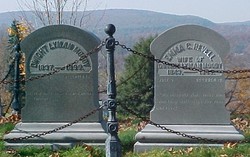 Moody said “Some day you will read in the papers that D. L. Moody, of East Northfield, is dead. Don’t you believe a word of it! At that moment I shall be more alive than I am now.” His son Will said in 1899: “To the world, Friday, December 22, was the shortest day of all the year, but for Dwight L. Moody its dawn ushered in that day that knows no night. For 46 years he had been a partaker of the divine life, and the transition from the seen world to the unseen, from the sphere of the temporal to that of the eternal, was no interruption in the life with which his friends were familiar. For nearly half a century his one aim in life had been to do the will of God, and he responded with a characteristic readiness to God’s summons.” May we do the same!
Moody said “Some day you will read in the papers that D. L. Moody, of East Northfield, is dead. Don’t you believe a word of it! At that moment I shall be more alive than I am now.” His son Will said in 1899: “To the world, Friday, December 22, was the shortest day of all the year, but for Dwight L. Moody its dawn ushered in that day that knows no night. For 46 years he had been a partaker of the divine life, and the transition from the seen world to the unseen, from the sphere of the temporal to that of the eternal, was no interruption in the life with which his friends were familiar. For nearly half a century his one aim in life had been to do the will of God, and he responded with a characteristic readiness to God’s summons.” May we do the same!

